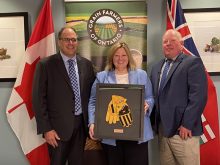In an effort to increase private-sector investment in cereals research, Agriculture and Agri-Food Canada and the Canadian Food Inspection Agency have tabled two possible strategies designed to promote better returns for plant breeders.
Private-sector investment in wheat and barley remains low in comparison to higher value crops such as corn, soybeans, and canola.
Why it matters: New strategies to encourage more research and varietal development in cereals could include changes to plant breeders’ rights and allowances for developers to charge new royalties. This could impact seed costs.
Read Also

Conservation Authorities to be amalgamated
Ontario’s plan to amalgamate Conservation Authorities into large regional jurisdictions raises concerns that political influences will replace science-based decision-making, impacting flood management and community support.
AAFC said only eight per cent of private sector seed investments are committed to research and variety development in cereals. Instead, plant breeding for major cereals are funded primarily by tax dollars and producer contributions.
After consultations with the Grains Roundtable, a group comprising industry representatives and policy makers, AAFC and CFIA identified the ability of farmers to save seed from year to year, and the declining profitability and acreage of cereals, as two major barriers to increase private sector investment in cereal breeding.
Two strategies to address these barriers have been proposed, both of which focus on establishing more concrete rules around contract royalties for new cereal varieties.
Strategy one: end point royalties
- A royalty payable on all harvested material that is collected where grain is sold or delivered, such as grain elevators.
Strategy two: royalty collection enabled via contracts
- This option allows for contracts where producers agree to conditions of use for farm-saved seed, like those existing for corn or soybeans.
The Canadian Seed Growers Association, Canadian Seed Trade Association, and CropLife Canada have announced their support for strategy two in a news release released Nov. 15.
As consultations between government, farmers, and other industry professionals continue others have yet to take a formal position
Dave Carey, executive director of the Canadian Seed Trade Association, says the need to develop better cereal varieties and increase the competitiveness of Canada’s cereal sector was flagged as an issue more than a decade ago. The end point royalties option, he says, would involve elevator operators determining which variety a farmer is delivering, the royalty payment for those bushels, and processing the transaction. This is not ideal because the option is inherently more complex, and elevator operators do not want to act as the middleman for royalty transactions, he says.
Royalties established through upfront contracts for registered cereal varieties would be more practical.
“It’s the small- and medium-sized companies that are saying they want to compete. This would benefit public and private breeders,” says Carey.
“We definitely don’t want the government to remove any funding they are committing to. What this would do is top that up. The breeder, regardless of where they work, would benefit from their right to that revenue stream….”
He adds that farmers who prefer to save seed, or those who don’t anticipate a favourable cost-to-benefit ratio, would be able to plant varieties not restricted by user contracts.
Contract law and breeder rights
Royalties from seed user agreements can already be used under Canada’s current contract law. However, Carey says it’s “cost-prohibitive” for smaller and public breeders.
“There would be a plethora of contract types out there with no group to assist in oversight or collection of the fees,” he says. “Changes to the regulations allows for a concerted dialogue with producers and gives small breeders the additional support of the use of contracts supported by federal regulation.”
“It also makes the whole thing much more transparent to have government involvement.”
Lorne Hadley, executive director of the Canadian Plant Technology Agency, a nonprofit organization supporting intellectual property rights within the seed industry, says legal clarification is also needed for current regulations pertaining to breeder rights and what’s called “farmer’s privilege.”
Farmer’s privilege is an exception within plant breeders’ rights regulations that allow farmers to save seed from registered crop varieties indefinitely, unless precluded by contract.
Hadley says the current language may lead people to believe they can act in a way that the contract would restrict.
“The language has to be edited a bit so farmers can understand it,” he says. “What goes on in other countries gets brought up a lot…. We have a totally different regulatory system in Canada. What we’re seeking is a made-in-Canada solution, based on the system we have today.”
Deliberations continue
Crosby Devitt, vice-president of strategic development for Grain Farmers of Ontario (GFO), says his organization has been discussing this issue for some time and continues to be open to options that will support cereal growers. He agrees that many producer groups, like GFO, are already investing in cereal development, but the level of investment doesn’t match what the private sector can do.
“If we invest more in cereals the more we get out of it in the end. It’s a numbers game. We’re always in support of new innovation,” said Devitt.
“GFO doesn’t have a position on either proposal at this point. We’re holding consultations with delegates during a policy day in December to try and formulate a position.”
Many other producer associations also continue to deliberate the merits of both value proposals, as well as the status quo.













